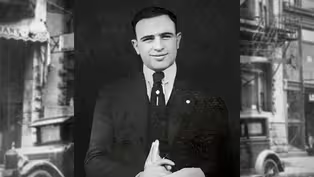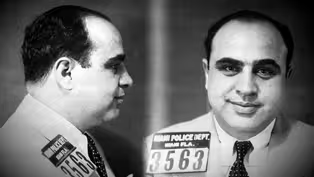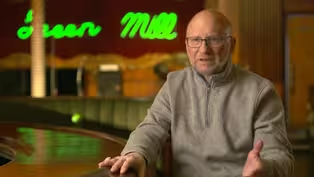Chicago Stories
Al Capone and Prohibition
Clip: 11/1/2024 | 4m 11sVideo has Closed Captions
Al Capone and Johnny Torrio capitalize on Prohibition.
Al Capone and Johnny Torrio capitalize on Prohibition, and the profits come rolling in.
Problems playing video? | Closed Captioning Feedback
Problems playing video? | Closed Captioning Feedback
Chicago Stories is a local public television program presented by WTTW
Lead support for CHICAGO STORIES is provided by The Negaunee Foundation. Major support is provided by the Abra Prentice Foundation, Inc. and the TAWANI Foundation.
Chicago Stories
Al Capone and Prohibition
Clip: 11/1/2024 | 4m 11sVideo has Closed Captions
Al Capone and Johnny Torrio capitalize on Prohibition, and the profits come rolling in.
Problems playing video? | Closed Captioning Feedback
How to Watch Chicago Stories
Chicago Stories is available to stream on pbs.org and the free PBS App, available on iPhone, Apple TV, Android TV, Android smartphones, Amazon Fire TV, Amazon Fire Tablet, Roku, Samsung Smart TV, and Vizio.
Providing Support for PBS.org
Learn Moreabout PBS online sponsorship(tense music) (bottles shattering) - [Narrator] Prohibition took effect on January 16th, 1920, banning the manufacture, sale, or transportation of alcohol.
Intended to promote moral and social reform, the law instead provided gangsters with their greatest opportunity yet.
- By the time it's enacted, the public sentiment has changed.
The war is over.
(patrons chattering) We wanna celebrate, we wanna have a good time, we wanna cut loose.
You see, you know, women starting to wear these shorter skirts and smoking and drinking in public, and Prohibition suddenly seems like a terrible idea, but it becomes the law.
- [Narrator] Legitimate bars closed their doors overnight, and a lucrative black market of bootlegging took over.
- If not for Prohibition, we never would've heard of Al Capone.
He would've been a bartender, he would've been a janitor, or he would've just gotten into a bar fight and killed somebody and spent the rest of his life in jail.
But there is no Al Capone without Prohibition.
- Chicago was a very, very, very good place to be a bootlegger during Prohibition if you chose to.
Why?
One, it's a hard drinking town.
The average Chicagoan drank three times as much hard liquor as the average American.
The second thing, there's an unparalleled level of corruption and a virtual breakdown of law and order in general in the Chicago area during Prohibition.
- One of the biggest industries in America had just been declared illegal.
You know there's demand.
All you have to do is create the supply.
- Once Prohibition goes into effect, it's still about $5 to produce a barrel of beer, but now you can sell it for $55 or more.
- [Narrator] It was a ticket to easy street and Torrio wanted in, but Colosimo wouldn't budge.
- Johnny Torrio, perhaps more than anyone in Chicago, sees that they could make more money than they've ever dreamed of.
This is like Microsoft, (chuckles) you know, that's the vision he's got.
The cops aren't really standing in their way, the mayor isn't standing in their way.
"Big Jim" Colosimo's standing in his way a little bit because he's the biggest operator in town.
- [Narrator] Big Jim, who had married Torrio's Aunt Victoria, was already in the way.
And then he fell for a songbird and sealed his fate.
- He started running around with a singer by the name of Dale Winter.
And Johnny Torrio, now that this man has very, very unceremoniously divorced his beloved aunt and has taken up with a singer, he owes this man no personal loyalty, and the die is cast.
- You get rid of him, what else is there, right?
So, Colosimo's gotta go.
- [Narrator] Torrio called in a favor from Frankie Yale in New York, his old friend from the Harvard Inn days.
(tense music) On the afternoon of May 11th, 1920, (gun bangs) Yale strode into an office across the street from Colosimo's Cafe and fired a .38-caliber slug into the base of Big Jim's brain.
- And so when the police couldn't find any witnesses to testify about the murder of Big Jim, the newspapers started to refer to this as a case of Chicago Amnesia.
- [Narrator] Rumors surfaced that Capone was in on the hit.
No one was ever charged.
- Shortly after Colosimo's death, Torrio inherits his operation and he soon begins to expand beyond the vice of the era, primarily gambling and prostitution, to include bootlegging.
- [Narrator] Torrio designated Al Capone as his right-hand man.
- It's almost like he was born for this.
And he gets to Chicago as a young man, willing to do anything, willing to try anything, desperate to make money to support his family.
And he's got connection to the guy who may be the most important figure in the Chicago criminal world.
Video has Closed Captions
Clip: 11/1/2024 | 6m 6s | Al Capone was born in Brooklyn and made his way to Chicago as a young man. (6m 6s)
Video has Closed Captions
Clip: 11/1/2024 | 7m 14s | A tax evasion charge brings down Al Capone. (7m 14s)
Extended Interview: Dave Jemilo, Owner of The Green Mill
Video has Closed Captions
Clip: 11/1/2024 | 4m 35s | Dave Jemilo shares the lore behind the famous cocktail bar Al Capone frequented. (4m 35s)
Providing Support for PBS.org
Learn Moreabout PBS online sponsorshipSupport for PBS provided by:
Chicago Stories is a local public television program presented by WTTW
Lead support for CHICAGO STORIES is provided by The Negaunee Foundation. Major support is provided by the Abra Prentice Foundation, Inc. and the TAWANI Foundation.


















